The Woman King
 for sequences of strong violence, some disturbing material, thematic content, brief language and partial nudity.
for sequences of strong violence, some disturbing material, thematic content, brief language and partial nudity.
Reviewed by: Alexander Malsan
CONTRIBUTOR
| Moral Rating: | Very Offensive to Extremely Offensive |
| Moviemaking Quality: |
|
| Primary Audience: | Adults Young Adults |
| Genre: | Action Drama |
| Length: | 2 hr. 15 min. |
| Year of Release: | 2022 |
| USA Release: |
September 16, 2022 (wide release—3,675 theaters, including IMAX screens) DVD: December 13, 2022 |
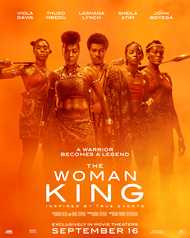

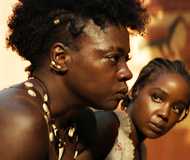
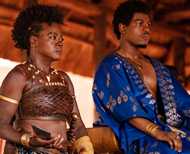
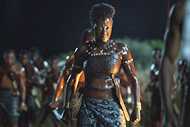
The Kingdom of Dahomey was located within present-day Benin in West Africa
Capture of humans by Africans and selling them as slaves
Mass murder by sacrifice
Gross immorality of various kinds
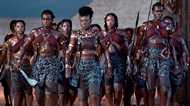
Human blood spilling ceremonies
Pregnancy due to repeated rape
About murder
About death
FILM VIOLENCE—How does viewing violence in movies affect families? Answer
About idolatry and false gods in the Bible
About idols in the Bible
About SLAVES and SLAVERY in the Bible
Is the FEMINIST MOVEMENT the right answer to the mistreatment that some women endure in this sinful world? Answer
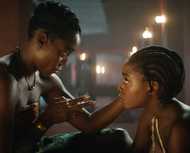
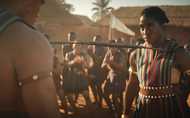
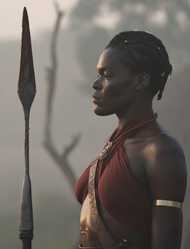
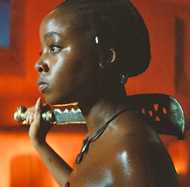
| Featuring |
|---|
|
Viola Davis … Nanisca Thuso Mbedu … Nawi Lashana Lynch … Izogie Sheila Atim … Amenza John Boyega … King Ghezo (Gezo) Jordan Bolger … Malik Hero Fiennes Tiffin … Santo Ferreira See all » |
| Director |
|
Gina Prince-Bythewood Writers: Dana M. Stevens (Progressive Liberal activist), Maria Bello |
| Producer |
|
TriStar Pictures JuVee Productions See all » |
| Distributor |
Revisionist-history that honors the enslavers

The year is 1823. The Kingdom of Dahomey is a vibrant, thriving civilization located in the heart of West Africa. The people are ruled by King Ghezo (John Boyega). The people of Dahomey have been doing well, in part, due to an ongoing love-hate relationship with the Oyo Empire and the Mahi Tribe (they pay tributes to the Oyo and the Oyo allow the Dahomey people access to the trade routes). What is the Dahomey’s main source of income? Slavery. The Dahomey have built another ongoing relationship with the Portuguese when it comes to their slave trade (the Dahomey provide the Portuguese African slaves in exchange for goods).
The Dahomey are protected by a fierce, yet revered group of female warriors, the Agojie. The Agojie are led by the mighty General Nanisca (Viola Davis). The Agojie live within the palace walls with their own set of principles: they serve as the king’s guard, take up no husbands, bear no children but will have their voices heard and will be feared by all in Africa. General Nanisca, who generally abstains from politics, advises King Ghezo that there are other means of making economic progress in Dahomey OTHER than slavery, such as in the production of palm oil. Perhaps she’s right. After all, she is being considered to serve as Ghezo’s right hand ruler, the Woman King.
In any case, General Nanisca and her lieutenants, after having successfully recruited and trained new Adojie, receive word that the Oyo and other tribes are making plans to attack the Dahomey and conquer the land. The Dahomey are small in size, but they are mighty.
All hail the Woman King.
I can recall the first time I saw trailer for this film. It popped up on my Facebook feed as an advertisement. At first I saw the title and thought, “What is a Woman King? Aren’t women usually designated as queens?” Perhaps, for many, that is the draw to view this particular movie. Or perhaps the draw-in will be a strong female heroine who is destined to become a Woman King.
There is a particular danger with “The Woman King” I can’t rightly ignore. Like a mouse headed toward a mousetrap, there is an air of caution surrounding this film, particularly as “The Woman King” deems itself as a “historical portrayal” of various events that occurred within the Dahomey tribe. The problem is that this “historical portrayal” is anything BUT historically accurate. In fact, most of the messaging and what is shown on screen goes against what history tells us.
A good reviewer always does his research, and I certainly did mine. Here are the actual facts behind “The Woman King.”
THE FACTS
There was no General Nanisca so the conversations that occurred between her and King Ghezo (or any of her backstories for that matter) are completely fabricated.
Though Ghezo did at one point explore palm oil production as an alternative source of revenue, it proved far less lucrative, and the king soon resumed Dahomey’s participation in the slave trade.
The Dahomey were largely involved in the Atlantic Slave Trade and refused to stop raiding villages and taking slaves to sell to the Europeans, Arabs, Asians, and South Americans, even the Native Americans owned African slaves. Their involvement in the slave trade was SO bad that “In 1851-1852, the British imposed a naval blockade on the ports of Dahomey in order to force them to end the slave trade, which the Dahomey people agreed to.”
The warrior women that they depicted in this film as the good guys would literally raid villages and slaughter the men and woman and take the children. The Dahomey would also keep their own slaves to work on their own plantations.
The captives are treated far better in the film than in reality. In truth, the Dahomey also SACRIFICED their captives. Human sacrifice was common in West African states up to and during the 19th century. Slaves were the most prominent victims. The Annual customs of Dahomey were the most notorious example of human sacrifice of slaves, where 500 prisoners would be sacrificed.
Now, I must admit, the film never starts off by saying “inspired by true/actual events.” That’s fair. The messaging, the presentation, however, is all the same. “The Woman King” tries to rewrite history in all the wrong ways; a problem that seems to plague us in current times and in everyday issues (e.g. The founding of the United States, etc.). You CANNOT simply rewrite history because it does not fit your political or worldview narrative (and yes, there are a few narratives in this film, including a very progressive, liberal-like narrative sprinkled throughout). In fact, many African Americans are upset by the mis-portrayal of their ancestors on screen. According to one source, “American blacks are very upset about it because it makes evil people (the people that captured them and sold their ancestors into slavery) seem like heroes, and attempts to rewrite slave history.”
To be completely fair to “The Woman King,” cinematically (apart from the skewed history) the film is impressive. The performances are some of the strongest I’ve seen in an action film in a while. The performance by Viola Davis is very good. You can feel her passion, her pain, her struggles in every scene she’s in. Additionally, Thuso Mbedu gives a very solid supporting performance as Nawi. Lashana Lynch brings a mysterious, yet humorous side to the character Izogie.
Additionally, the pacing of the film never fails. While it may seem that 2 hours is a bit long for a drama/action flick, the pacing doesn’t feel that way (although there are times I felt there were too many side situations occurring). However, in the end I walked away feeling like most of my questions were answered.
Content of Concern
VIOLENCE: Very Heavy. Please note this is just a summary. There is much bloody violence and large scale killing/murder. Throats are slit. People are beheaded, impaled, stabbed or sliced (in chests, necks, crotches, etc.), shot, or skewered with swords or spears. Inside the palace we even see skulls on a pike. A basket of severed heads is shown to a group of townspeople. The Agojie display the skulls of their defeated foes. We are shown multiple grotesque corpses in raided town. A woman is raped (we see it flashbacks) and we see the results of that (there are scars on the woman). We’re told that if an Agojie is caught, she will be abused until death and then left to rot. A group of young Agojie trainees have to prove their worth by climbing through a mountain of long-thorned bushes, then over tall wooden structures before giving battle to a male opponent. After this event we see a woman pulling thorns out of her many cuts. There is a spear challenge where two people place a sharp two-headed spear between them and pointed in their chests and pressing it into each other until the pain becomes unbearable. The neck of a man is snapped. We see slaves beaten, chained and tied up by their wrists. A horse is sliced to cause the rider to topple its rider. A port city is set on fire. A potential husband for Nawi gets angry at her and slaps her across the face. She knocks him down in return. Someone’s arm is broken and then we watch as it is set back into place.
PROFANITY: “H*ll”
VULGARITY: “B*stards,” “B*tches”
SEX: It is mentioned that a woman’s virginity was sold as a 14 year old child and that many men raped her. A brief flashback is shown with her tied down and being raped. She gets revenge by burning him with an ember (we see the marks on her hand later). Prostitutes are suggested to a man. The King has multiple wives and says “my love” to all of them. The men inside the palace are eunuchs.
NUDITY: A man is shown in full frontal male nudity in front of a woman; he covers his genitals. We see some shirtless males. Women wear cleavage-baring and midriff-baring outfits. A couple women are shown bathing (apparently nude, but only their shoulders and upper chest are visible above water). Slave women are shown bare backed, being washed before sale. The breasts of one of these is examined (clothed) and fondled by a slave buyer. Women are shown covered only in towels or sheets.
ALCOHOL: Some characters drink whiskey.
OCCULT: It is mentioned that the king is appointed by the gods. The Dahomey worship two gods, Mahu and Liza and they are mentioned throughout. A blood oath is made to become Adojie, and the blood is poured onto a shrine for the gods. Nanisca is seen at a shrine for these gods a couple times. A character is seen using “rocks” to see into Nanisca’s future.
Q & A
About idolatry and false gods in the Bible
About idols in the Bible
What is the Occult?
The Occult—What does the Bible say about it?
OTHER: A daughter is almost given away in an arranged marriage. Slavery is a major form of commerce and shown throughout the film, especially their sale.
Lesson
In the film, Nanisca and King Ghezo are forced to face the reality of the slave trade and just how cruel it is. However, in reality, this king (played by John Boyega) is known as “West Africa’s most notorious slave-trading monarch…” known for his cruelty.
Q & A
See off-site secular articles about the true history — Apie News, NeusRoom, Face2Face Africa, Robin Law, University of Stirling
Doing what is right, what is good, what is just is not always easy as a Christian. Often, you’ll stand alone. You’re not alone though. God is with you when you stand FOR HIM. The reward for standing with God is far greater than what the world can ever offer. Jesus states…
“But seek first the kingdom of God and his righteousness, and all these things will be added to you.” —Matthew 6:33
Scripture also states…
“Blessed is the man who walks not in the counsel of the wicked, nor stands in the way of sinners, nor sits in the seat of scoffers” —Psalm 1:1
“Only let your manner of life be worthy of the gospel of Christ, so that whether I come and see you or am absent, I may hear of you that you are standing firm in one spirit, with one mind striving side by side for the faith of the gospel.” —Philippians 1:27
“Therefore put on the full armor of God, so that when the day of evil comes, you may be able to stand your ground, and after you have done everything, to stand.” —Ephesians 6:13
Final Thoughts
Let’s be honest (and other reviewers have stated the exact same thing), history doesn’t sell anymore; at least not accurate history. “The Woman King” is a prime example, among hundreds of other examples, of how producers can twist the truth just enough to make a film appear historically accurate and authentic when, in truth, it isn’t (if you need another example, look no further than “The Greatest Showman.” The film is FULL of inaccuracies).
Historically skewed with a very Progressive Liberalism message, the film does however have high cinematic quality. Unfortunately, the level of violence is a problem. Additionally, the references to rape, idolatry and the occult that are spread throughout should make this film an absolute pass for Christians of all ages. There really is no reason to see “The Woman King.” You are better off viewing something far more redeeming, far more deserving of your time. Save your money.
- Violence: Very Heavy
- Wokeism: Heavy
- Nudity: Heavy
- Occult: Moderately Heavy
- Sex: Moderate
- Drugs/Alcohol: Mild
- Profane language: Minor
- Vulgar/Crude language: Minor
Learn about DISCERNMENT—wisdom in making personal entertainment decisions
 Every time you buy a movie ticket or buy or rent a video you are in effect casting a vote telling Hollywood, “I’ll pay for that. That’s what I want.” Read our article
Every time you buy a movie ticket or buy or rent a video you are in effect casting a vote telling Hollywood, “I’ll pay for that. That’s what I want.” Read our article
See list of Relevant Issues—questions-and-answers.


PLEASE share your observations and insights to be posted here.
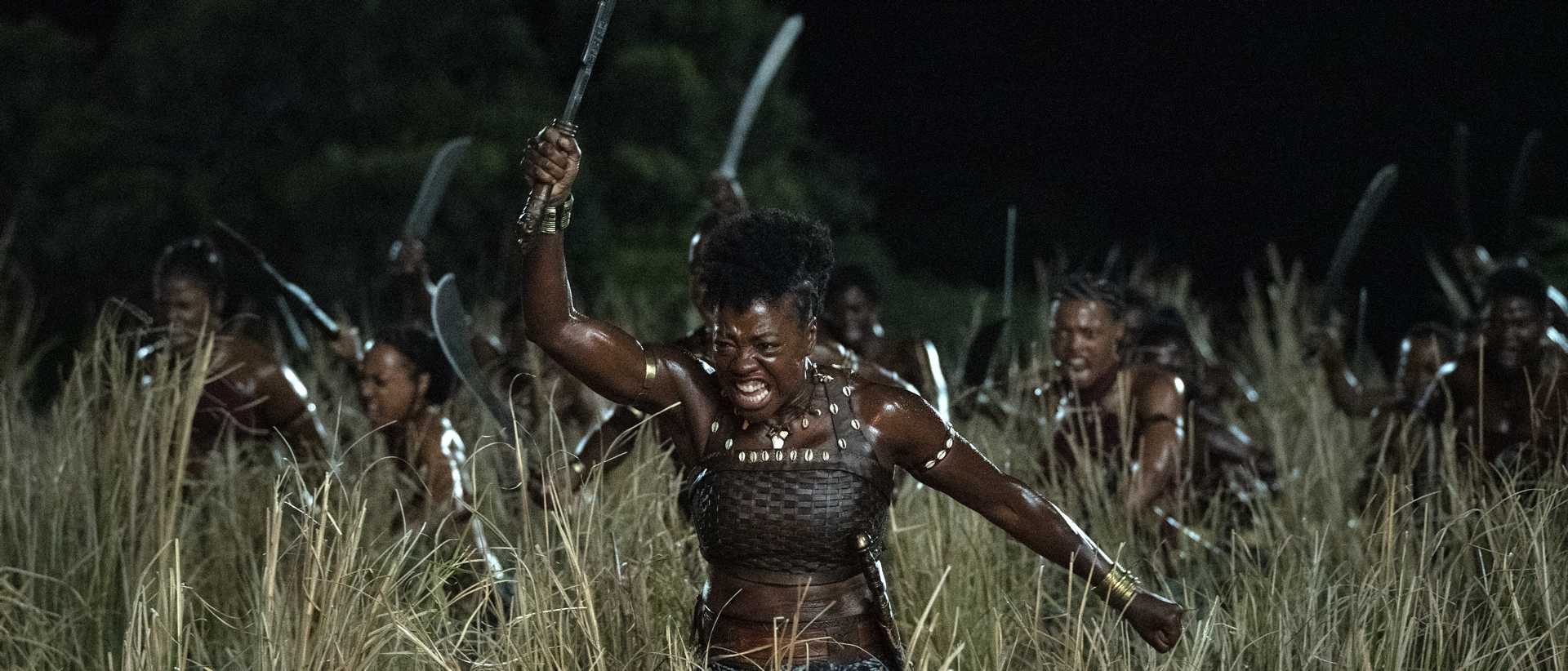
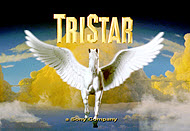
I am squeemish to violence, and so I’ll add that the battle scenes are somewhat gruesome, but not as much so as “Braveheart” (another favorite). You can actually close your eyes for much of those scenes, and not miss much. The training and strategizing for battle was much more central to the plot.
It also does have some paganism (idols placed to honor the fallen, a plot involving “hearing from the gods” via casting stones), with a reference to Christian missionaries being on the continent. I was not offended, but rather saw it as a reflection of West African culture, especially during that time period.
I walked out of the theater very inspired and excited to learn more not only about Dahomey but the entire region of West Africa during that time period. As a Black woman, I grow tired of hearing “all I came from are slaves” and learning the SAME stories about MLK or Rosa Parks as if they are the ONLY historical Black figures who ever had impact. Yes, I am proud and grateful that I am a descendant of slaves—it’s by the grace of God we have both survived and thrived despite GENERATIONS of attempts at enslaving, silencing, or subduing us. But I was excited to learn that I am ALSO the descendant of warriors, leaders, and tribes with a very rich culture.
My Ratings: Moral rating: Offensive / Moviemaking quality: 5